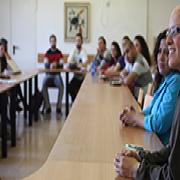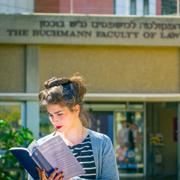Law & Social Change - Volume 1
Table of Contents:
Neta Ziv, Two Decades of Cause Lawyering in Israel: Where Do We Go from Here?
Tal Korman & Ofer Sitbon,An Interview with Meni Mazouz, Israel's Attorney General.
Orly Lobel, The Paradox of Extra-Legal Activism: Critical Legal Consciousness and Transformative Politics.
Nomi Levenkron, The Goat, the Clinic, and Trafficking in Women.
Hassan Jabareen, The Rise of Transnational Lawyering for Human Rights.
Yuval Elbashan, Dilemmas in the Representation of Excluded Communities by Public Interest Lawyers .
Dan Yakir & Yonatan Berman, Same-Sex Marriages: Is It Really Necessary? Is It Really Desirable?.
Amit Bracha, The Practice of Environmental Justice.
Abstracts:
Ofer Sitbon (Translated by Ruvik Danieli)
“The philosophers have only interpreted the world, in various ways; the point, however, is to change it.” (Karl Marx, “Theses on Feuerbach”, in 2 Karl Marx and Friedrich Engels, Selected Works 367 (1949).)
The periodical “Ma’asei Mishpat” (Tel Aviv University Journal of Law and Social Change) proposes a new agenda for the theoretical legal debate in Israel. It seeks to provide a podium for study and research into questions from the field of social legal endeavor, and thus to assist in positioning this field as a central and independent legal sphere. The periodical will offer new viewpoints toward this endeavor, placing emphasis on the struggle on behalf of the rights of excluded populations. By so doing, “Ma’asei Mishpat” seeks to become more than just a venue for theory and research. It seeks to actually take part in the struggle for the tikkun (repairing and reforming) of Israeli society.
Dealing with the social role of law occupies a central place in modern thinking. According to Marx’s celebrated theory, the legal system functions as a conservative factor intended to fixate the existing economic and social order, and to grant it - by dint of the powerful images of justice and equality embedded in it - the appearance of objectivity. This conception has been interpreted in various ways; in recent decades it has, among other things, taken on new form in the guise of Critical Legal Studies (CLS). Beside this legal approach there is also another, more optimistic conception, which views the legal system as a central and effective tool in campaigning for social reform. A hundred years ago the American Realists already pointed to the gap between the law in the books and the law in action, contending, contrary to formalistic legal approaches, that the courts must also take into consideration the possible social consequences of their rulings. This conception won acceptance in the course of the 20th century, and the legal system has been perceived, mainly by progressive writers, as a primary instrument in the promotion of “social engineering” and in the construction of the modern welfare state…
Full First Act is available here.
Two Decades of Cause Lawyering in Israel: Where Do We Go from Here?
Neta Ziv
This article reviews two decades of public interest lawyering in Israel, situating the phenomenon in the broader context of cause lawyering as a professional practice. The practice of public interest law derives from two subsidiary questions: the manner whereby legal resources are allocated in society; and the public role of lawyers. The article describes Israeli society’s policies and practices relating to these questions and their influence on the development of public interest lawyering in Israel, going on to describe the conditions that enabled its emergence, the topics handled by the lawyers, and the strategies they have adopted. The article ends by offering some thoughts on possible directions for cause lawyers’ new forms of practice in an era of ever-changing politics and economics in a globalized world…
Full article is available in Hebrew here.
An Interview with Meni Mazouz, Israel's Attorney General
Tal Korman & Ofer Sitbon
Full interview is available in Hebrew here.
From a “Constitutional Revolution” to a “Counterrevolution”: the Legal Logic of the Privatization Regime in Israel
Dani Gutwein
The prevalent approach views Justice Minister Daniel Friedman’s struggle against the authority of the Supreme Court and its Chief Justice as a “counterrevolution” meant to overturn the achievements of the “constitutional revolution” initiated by former Chief Justice Barak. Contrary to this approach, this article proposes to view both developments as complementary steps in the adjustment of the Israeli justice system to different stages of the privatization regime in Israel. The article’s main contention is that the “constitutional revolution” adapted the justice system to the assumptions of the “sectorial phase” of the privatization regime during the 1980s and 90s, while the “counterrevolution” is adapting it to the current “oligarchic phase”…
Full article is available in Hebrew here.
The Paradox of Extra-Legal Activism: Critical Legal Consciousness and Transformative Politics
Orly Lobel
The limits of law in bringing about social change have long preoccupied legal thinkers. In a recent development, however, new schools of thought build upon the critical understanding of these limits to produce a body of literature that privileges extra-legal activism in a variety of ways. These writings present themselves as alternatives to the path of legal reform, avoiding the risks of cooptation and deradicalization, the fate which has befallen earlier legalistic activism. Three extra-legal focal points emerge in this literature: (1) a move away from professionalism to “lay lawyering”; (2) a move from the legal arena to an “autonomous sphere” of action; and (3) a departure from formal legal norms to softer, “informal” normativities. The article demonstrates how these recent developments are misdirected, as they draw erroneous conclusions from critical understandings about the cooptative risks of legal strategies. In particular, contemporary proposals of extralegal reform strategies fail to recognize the ways in which such alternatives are frequently subject to the same shortcomings they seek to evade by opting out of the legal arena. The article argues that the contemporary manifestation of a critical legal consciousness has eclipsed the origins of critical theory, which situates various forms of social action on more equal grounds. The new extra-legal truism, which rejects law reform as a transformative path for social change, consequently risks reinforcing the very account that it sets out to resist -- that the state is no longer able to ensure socially responsible practices in the 21st century economy…
Full article is available in Hebrew here.
The Goat, the Clinic, and Trafficking in Women
Nomi Levenkron
The article discusses the skills required of students participating in the various clinical legal education programs. It argues that, as opposed to the usual requirements in academia, where the emphasis is on academic excellence, the main skills required of students in law clinics are original thinking, creativity and, most of all, the ability to diagnose human rights violations of all kinds. The article reviews the contribution of clinical work performed by the law clinic at the Hebrew University (operating since 2003) to the struggle against trafficking in women. It also surveys the various tools, legal and others, which were employed to significantly reduce this atrocious phenomenon…
Full article is available in Hebrew here.
When Labor Becomes a Commodity Again: A Critical Examination of Abnormally Low Bids in the Procurement of Employment Services
Avishai Benish & Roie Tsarfatie
This article examines whether “abnormally low” bids (meaning bids that ask for a price that is lower than the actual cost of the service provided, so it clearly does not enable the employer to pay lawful wages) in tenders for the procurement of labor-intensive services are legitimate bids that derive from legitimate economic motives, or whether they are a recipe for low-quality service and violation of the workers’ employment rights. This article – which is the product of clinical work performed in the Employment Relief Clinic at the Hebrew University – argues that the idea of abnormally low bids is illegitimate, and that evidence shows a close connection between extremely low bids and the violation of the contractors’ workers rights in labor-intensive service (such as security and cleaning services). Furthermore, we argue that accepting abnormally low bids is contrary to the principle of equal opportunity and that below-labor-cost bids are causing a “race to the bottom”, giving unlawful contractors an unfair comparative advantage over law abiding contractors. The article argues also that procurement law should not only take into consideration narrow cost concerns, but also incorporate principles of employment and labor law and the notion that “labor is not a commodity”. Proper judicial and administrative policy should support the values of protecting the rights of the workers and the rule of law over cost-saving and should therefore dismiss abnormally low bids…
Full article is available in Hebrew here.
Signs and Sovereignty: Court Appeals against Highway Billboards as a Struggle over the Commons
Daniel Mishori
The article deals with a court appeal on behalf of the “Green Action” association against billboards advertising alongside the Ayalon highways in metropolitan Tel Aviv. The appeal raised issues which were rarely discussed before in Israeli courts: the commons, the public rights in public spaces, the role of the local and governmental agencies as trustees of these rights, and the issue of advertising as a pollution of the mental environment. The article discusses the evolution of the conceptual framework of the appeal, and the attempt to shape a legal definition of the public space which would help to characterize the commons and provide guidelines and constraints which would protect the rights of the public. The article surveys the original debates in the Knesset over the law which banned advertising along highways (1965), and shows that “modern” themes such as mental pollution, the critique of consumerism and the aesthetic value of the landscape influenced the formulation of the law. This provided the “Green Action” association with a solid basis for expressing the “radical” views in the Israeli court. The paper concludes with a short discussion on the relevance of business ethics to the advertising companies’ political, legal and public struggle over their “rights” to continue using the public/mental space…
Full article is available in Hebrew here.
Cause Lawyering and the Reproduction of Professional Authority: An Introduction
Austin Sarat & Stuart Scheingold
Why do some lawyers devote themselves to a given social movement or political cause? How are such deeds of individual commitment and personal belief justly executed, given the ideals of disinterested professional service to which lawyers are (in theory, at least) supposed to adhere? What can we learn from such lawyers about the relationship between law and politics? This text is a collection of responses to these questions, featuring a number of legal scholars concerned with anti-poverty lawyers, lawyers who work against capital punishment, immigration lawyers, and other lawyers working to end oppression. Editors Austin Sarat and Stuart Scheingold have assembled here a cross-national portrait of lawyers compelled to sacrifice financial gain so as to use their legal skills in the promotion of a more just society. These essays explore the relationship between cause lawyering and the organized legal professions of many different countries - the US, England, South Africa, Israel, Cuba, and so forth.;This book is intended for law and society scholars, political scientists, scholars and students of the legal profession..
Full article is available in Hebrew here.
The Rise of Transnational Lawyering for Human Rights
Hassan Jabareen
The available literature on cause lawyering focuses primarily on the work of lawyers within the national boundaries of the sovereign state. The laws, the courts and the communities that are addressed by the law and mobilized by these lawyers are all local. Legal success is determined, according to this literature, as the outcomes of cases litigated in the national courts. This article attempts to expand the scope of this literature from the local to the global, and to explain the interaction and interconnection between these two realms. The first part analyzes the rise of transnational lawyering in the field of human rights. It argues that the use of transnational law by lawyers expands their legal imagination beyond the boundaries of their localities. It affects their legal strategies, it confers an additional meaning on their legal successes, it influences the question of legitimacy of oppressive legal systems, and it provides possibilities of legal resistance within the law and through it. It also addresses, speaks to and mobilizes the international community, which in turn creates local dynamics. The second part of the article attempts to demonstrate these arguments through specific reference to the cases of transnational lawyers working for the Palestinian legal organization “Adalah” in April 2002. In these cases, tried before the Israeli Supreme Court, Adalah’s lawyers attempted to protect Palestinian civilians in the Occupied Palestinian Territory against gross violations of their human rights perpetrated by the Israeli army during “Operation Defensive Shield”. The concluding part of the article considers, among other things, the effect of transnational lawyering on the decisions of national courts, as well as the tension it creates between the political system and the national courts…
Full article is available in Hebrew here.
Dilemmas in the Representation of Excluded Communities by Public Interest Lawyers
Yuval Elbashan
The good of the individual versus promotion of the required overall social change – this dilemma faces all lawyers working for social change. Their ostensibly twofold obligation, to both the “client” and the “public interest” which they aspire to promote, may give rise to a problem when the two collide. Ostensibly, the solution is clear: since the decision has crucial consequences to the life of the client, it should be theirs and theirs alone. In this case the cause lawyer’s responsibility is merely to present to the clients the options they have and leave it solely to them whether or not they are willing to pay a personal price for the purpose of advancing overall social change. In the case of excluded communities, however, the real – not the formal – choice, lies in the hands of the cause lawyer. This is because such communities, as part of their exclusion, do not have access to legal services and are missing many other resources – such as money, skills, knowledge, experience, and social networking – and so they are in many senses a “captive audience” of public interest lawyers. Thus, even if formally the choice is made by a weak and excluded client, it will still be made on the basis of information provided by the lawyer, and often stem from a desire to please the lawyer (being in the capacity of his sole and last salvation). The article contends that ultimately – essentially if not formally – it is the cause lawyer that must make the decision, and assume the responsibility for it…
Full article is available in Hebrew here.
Same-Sex Marriages: Is It Really Necessary? Is It Really Desirable?
Dan Yakir & Yonatan Berman
The article deals with the dilemmas surrounding the petition to the Supreme Court in the matter of Ben-Ari, in which the Court was asked to order the Ministry of Interior to record in the Population Register the marriages of same-sex marital partners who had married outside Israel. The Supreme Court eventually ruled in favor of the petitioners’ request, but the judgment was technical and lacked any rhetoric supporting the right of same-sex partners to equality. Though many in the gay-lesbian-bisexual-transgender community view marriage registration as a natural step that carries forward the legal achievements of the past 15 years regarding the rights of same-sex partners, it is impossible to ignore the lack of internal consensus within the group, and the question remains whether this is indeed a struggle for the advancement of human rights. The article critically analyzes the questions sparked by same-sex partners’ entrance into the institution of marriage and describes the doubts, both legal and personal, which beset the writers, who represented the petitioners on behalf of the Association for Civil Rights in Israel, in the framework of the court proceedings…
Full article is available in Hebrew here.
The Practice of Environmental Justice
Amit Bracha
This article seeks to map the different stages involved in the implementation of principles of environmental justice, which are gradually taking their place as part of the overall struggle for human rights in Israel. The article examines both theoretical and practical sides of the struggle for the application of environmental justice, placing emphasis on its inherently broad-based aspects – governmental, economic, social, educational, and health – among other things, by presenting test cases in which the “Man, Nature and Law” organization has assisted the struggle of underserved communities for an appropriate quality of life. The article points to the troubling discrepancy between the stage of conceptualization and theorization of the concept of environmental justice and the actual implementation of this principle…
Full article is available in Hebrew here.




